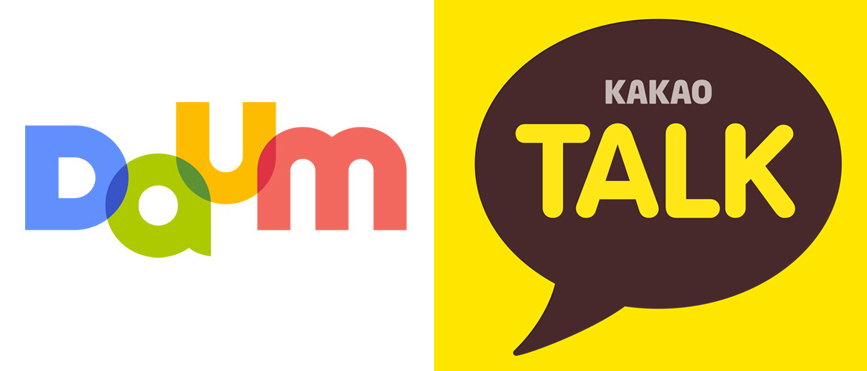- California Assembly OKs highest minimum wage in nation
- S. Korea unveils first graphic cigarette warnings
- US joins with South Korea, Japan in bid to deter North Korea
- LPGA golfer Chun In-gee finally back in action
- S. Korea won’t be top seed in final World Cup qualification round
- US men’s soccer misses 2nd straight Olympics
- US back on track in qualifying with 4-0 win over Guatemala
- High-intensity workout injuries spawn cottage industry
- CDC expands range of Zika mosquitoes into parts of Northeast
- Who knew? ‘The Walking Dead’ is helping families connect
Korean IT giants Daum and KakaoTalk to merge
By Yoon Sung-won
Daum Communications, the nation’s second-largest web portal, announced Monday it will acquire Kakao, the operator of the nation’s top mobile instant messenger service, foretelling an upheaval in the local mobile and Internet industry.
As a result of the stock swap arrangement which is expected to be the “biggest deal” in the IT industry here this year, the two firms will become an IT giant tentatively named “Daum Kakao” with a market capitalization exceeding 3 trillion won ($2.92 billion), according to Daum’s regulatory filing.
Competitor, Naver, has a cap estimated at 25.56 trillion won as of the end of Monday trading.
The integrated firm’s staff will number some 3,200 adding Kakao’s 600 to Daum’s 2,600.
The two firms said the merger will compensate for what each other lacks, and to create synergy from their respective strengths, in an effort to cope with rapidly-changing market conditions.
“Since the firms do not overlap in their business areas, Kakao’s competence in the mobile platform coupled with Daum’s strength in content, skilled human resources and business know-how will make further growth,” said Daum CEO Choi Sae-hoon during a press conference at a hotel in downtown Seoul, Monday. “We hope the merger will be a soft landing since the two companies share the common values such as emphasis on horizontal corporate culture and communication.”
“The merger will make us become a more competitive platform provider,” Kakao CEO, Lee Sirgoo said. “With this historical marriage between the two, we will go into uncharted territory in the IT industry.”
Earlier on Friday, the two companies held a board of directors’ meeting to approve the merger. A general meeting of shareholders in August will finalize the deal. The merger is expected to take place on Oct. 1.
The merger agreement calls for one Kakao shares to be exchanged for 1.556 new Daum share.
With the swap deal, unlisted Kakao shares will undergo a back-door listing.
The Korea Exchange has banned the trading of Daum shares until it determines whether to approve the back-door listing. The exchange will deliver a ruling within 45 days after the indirect listing application is filed.
Kim Beom-soo, chairman of Kakao’s board with the largest stake in the firm, will be the biggest shareholder of the combined company.
Kim and K-Cube Holdings owned by Kim currently hold a 53.6 percent stake in Kakao that will be converted into a 39.8 percent stake in Daum Kakao, compared with Daum Chairman Lee Jae-woong’s 3.4 percent.
Founded in 1995, Daum started with a web portal service and garnered popularity with the nation’s first free webmail and online community services.
The firm has optimized its services for the mobile environment as the mainstream online platform changed from web to mobile.
However, Daum has been failing to win in its competition with Naver, the country’s top web portal, both in web and mobile, and suffered from loss of users and sales.
Kakao has emerged as a leader in the mobile sector since it was launched in 2006, with its unrivaled popularity of Kakao Talk on the local market, and has expanded its services including social networking service Kakao Story and mobile game platform Kakao Game.
With more than 145 million subscribers to Kakao Talk around the globe, Kakao Game has dominated the nation’s mobile game platform market. It attracted over 500 million users as of this month and its cumulative sales surpassed 1 trillion won earlier this year, about 20 months since the launch of the service in July 2012.
Despite high expectations over the newly-established Daum Kakao, however, the two CEOs avoided suggesting details of their future, saying much has not yet been decided on strategies or restructuring.
“The two will concentrate on the merger process while maintaining their current business directions and strategies,” said Lee.
The headquarters of the unified company will stay on Jeju Island where Daum’s main office is located, Choi said.
















